J. Golden Kimball was a Mormon leader born in Salt Lake City, Utah in 1853. His father was Heber C. Kimball and his mother was Christeen Golden. He was quite poor as a child and then worked as a cowboy and a teamster, which started him on a path that led him to be known as the “Swearing Apostle.” Kimball became a Seventy in 1886 . Seventies serve as special witnesses of Jesus Christ. He died in 1938 at the age of 85.
J. Golden Kimball was not your ordinary Mormon General Authority. He has folk hero status and is known as a colorful person whose language was full of swear words and whose actions and speeches were outside the norm—although there was no question of his testimony, even when his methods were non-traditional. His comments are often a source of amusement within the Mormon community because he had a remarkable sense of humor.
The Too-Long Church Meeting
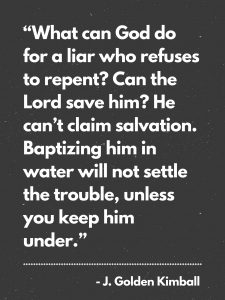 Today, Mormon church meetings last three hours and other types of meetings generally have a set amount of time allotted to them. In the past, they could go any length of time at all. One grueling day, the preaching went on and on, lasting most of the day without a break for lunch. J. Golden Kimball noted later that he was nearly dead when, at four o’clock, they finally called on him to be the last speaker. He was supposed to encourage people to subscribe to a church magazine. He stood up and said, “All you men that will take the Era if we will let you go home, raise your right hand.” Everyone thrust their hands eagerly into the air and the meeting was adjourned.
Today, Mormon church meetings last three hours and other types of meetings generally have a set amount of time allotted to them. In the past, they could go any length of time at all. One grueling day, the preaching went on and on, lasting most of the day without a break for lunch. J. Golden Kimball noted later that he was nearly dead when, at four o’clock, they finally called on him to be the last speaker. He was supposed to encourage people to subscribe to a church magazine. He stood up and said, “All you men that will take the Era if we will let you go home, raise your right hand.” Everyone thrust their hands eagerly into the air and the meeting was adjourned.
When a Speaker Was a Little Too Negative
After a speaker at a conference gave a long, scathing call on sinners and repentance, J. Golden Kimball was the next speaker. He was not impressed by the negativity of the talk and began his own by saying, “Well, brothers and sisters, I suppose the best thing for all of us to do is to go home and commit suicide.”
Serving a Mission
His mission to the South was a time of great growth for him. It was a tough place to be a Mormon in those days. Freed slaves and carpetbaggers were popular targets of gun owners there, but so were Mormon missionaries, who were sometimes even killed there. The Ku Klux Klan periodically confronted him with guns as well.
He hadn’t really wanted to go on a mission. He was thirty years old and enjoying his freedom. However, his mother asked him to meet with John Taylor, who was then the president of the Church. He did so, fully expecting to be told he wasn’t mission eligible, since he intended to show up looking as little like a missionary as possible. He arrived wearing dirty chaps and shirt, cowboy boots, a couple of guns and a Bowie knife. To his dismay, his mother’s letter had arrived first and President Taylor told him that he was sure Kimball would be as good a missionary as his father had been. Kimball gave in and went South.
After arriving in Chattanooga, he suggested to his companion that they go into the woods and learn how to sing hymns, pray aloud, and preach. Kimball could not carry a tune but after some practice, they felt the Spirit helping them and they were able to sing the songs. Elder Kimball then preached and was pleased that the Lord also helped him know how to deliver the sermon he had been practicing.
Then his companion said the closing prayer and they had closed their eyes and put their hands in the air as they did so. (This is not how Mormons pray today.) The prayer was very long, and when they opened their eyes, they discovered they were surrounded by four men with guns. Taking in the situation, Elder Kimball said, “‘That is another lesson. From this time on in the South; I shall pray with one eye open’” (in Conference Report, Oct. 1925, p. 158).
The Power of Song
This singing practice paid off in an unusual way. When he and Charles A. Welch, neither of whom sang well, were preparing to carry out some baptisms, a mob formed and warned them they would be thrown into the river if they continued. The two ignored them and began to sing a hymn, which Elder Kimball later recalled as being, “Truth Reflects Upon Our Senses.”
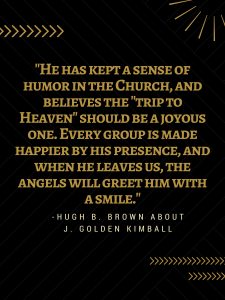 The mob seemed mesmerized and stood quietly. They carried out the baptisms peacefully and then decided to move away from the mob to confirm these people members of the Church. However, a message came asking them to return and sing the song again. The mob’s leader, Joseph Jarvis, joined the church, crediting the song and the presence of the Holy Ghost with his conversion.
The mob seemed mesmerized and stood quietly. They carried out the baptisms peacefully and then decided to move away from the mob to confirm these people members of the Church. However, a message came asking them to return and sing the song again. The mob’s leader, Joseph Jarvis, joined the church, crediting the song and the presence of the Holy Ghost with his conversion.
His testimony grew as he became more familiar with the workings of the Holy Ghost. “I often wonder, When you do have the Spirit of God? I used to think I had it in the Southern States, when I became excited and sensational, and my face was red, and the cords of my neck were swollen—I thought then, in my ignorance, that it was the Holy Ghost. I have learned since that the Spirit of God gives you joy and peace and patience and long-suffering and gentleness, and you have the spirit of forgiveness and you love the souls of the children of men” (in Conference Report, Oct. 1918, p. 29).
Serving as a Mission President
His most powerful experience came when he was later serving as a mission president, again in the south. This meant he presided over the younger missionaries and oversaw the missionary work. There were no church buildings for them to meet in, so they held a missionary meeting in the woods, where several missionaries and worked to clear an area. One missionary had a leg that was hugely swollen and there were no doctors in the area.
Elder Kimball told him there was no way he could go to the meeting, but the young man said he felt his whole mission would be ruined if he missed it. He’d been looking forward to it with his whole heart. Elder Kimball was touched by his faith and asked two missionaries to carry him the one mile into the woods. They did so and then, when the meeting began, Elder Kimball asked the missionaries what they had been preaching.
They responded that they were teaching the gospel of Jesus Christ. He asked if they taught that as priesthood holders, they had the power and authority to heal the sick? They agreed that they were. He then asked them why they were preaching it if they didn’t believe it. The young man with the injured leg said he believed it and moved to a stump. The other missionaries, understanding the point being made, gathered around him and they gave him a healing blessing. He was healed right there, as they watched. They then healed the other missionaries who were ill.
While J. Golden Kimball has developed a reputation as the Swearing Apostle, looking beyond the legends shows a man with a deep faith and capable leadership — even if it was sometimes unorthodox in nature.
About Terrie Lynn Bittner
The late Terrie Lynn Bittner—beloved wife, mother, grandmother, and friend—was the author of two homeschooling books and numerous articles, including several that appeared in Latter-day Saint magazines. She became a member of the Church at the age of 17 and began sharing her faith online in 1992.

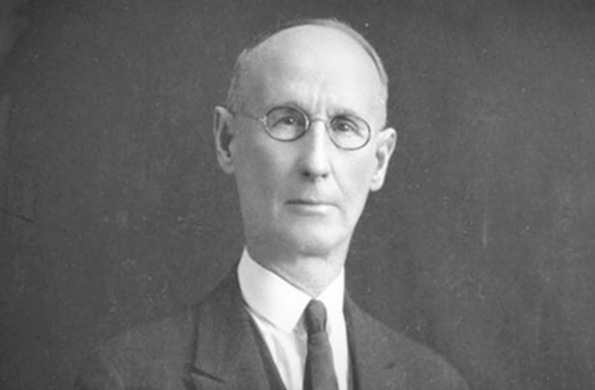
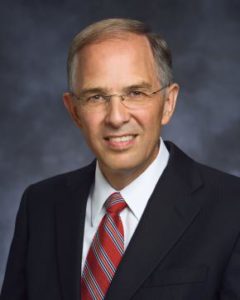
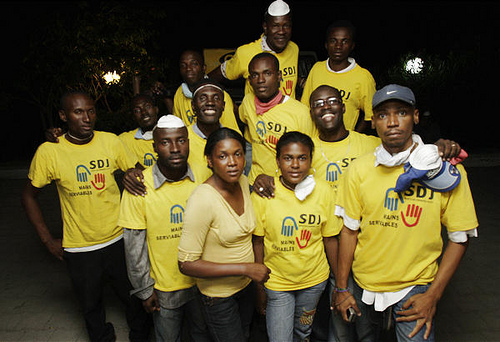
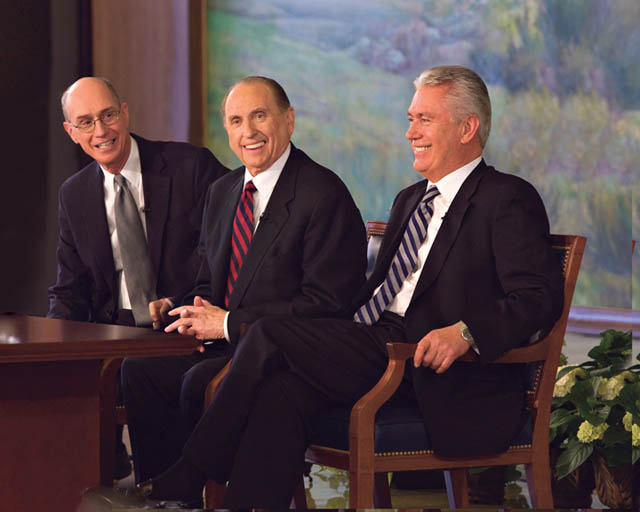


When on my mission somebody had a talk tape made by some actor who put together a bunch of things J Golden Kimball said (or has been accused of saying) into a single sermon and delivered it as if he were him. It was so funny.
Brother, my name is Robert Tea and I joined the Church when I was almost 25 in San Diego, Ca. on March 15, 1986. My older friend who answered my questions about the Church took me to our local Stake Ctr to watch the April 1986 Priesthood session where President Hinckley gave a talk called “The question of a mission”. I then served from age 26-28 in the Australia Brisbane Mission. He gave me a cassette of J Golden Kimball giving a full talk. I WILL BUY THIS! Do you have ANY idea where I can get a copy? I’ve reached out to my friend’s family but no go…
Robert,
I’m SO sorry — I can’t seem to find any kind of audio cassette/CD with any of his talks. The closest thing I found was this paperback book containing some of his sermons. I’ll keep looking and let you know if I find anything!
Thank you! Those were funny stories you told here. He sounds like a very refreshing church leader!
He was a pistol for sure! Glad you enjoyed the article.